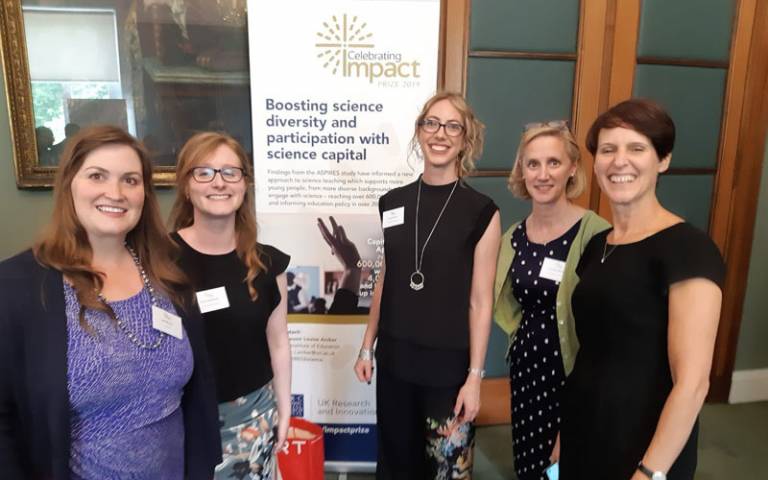IOE project wins award for its social and economic impact
10 July 2019
UCL Institute of Education’s (IOE) ASPIRES study has won the Panel’s Choice category at the ESRC Celebrating Impact Prize awards for its work in increasing young people from more diverse backgrounds to engage with science.

Held at the Royal Society, London on 9 July, the Celebrating Impact Prize recognises and rewards Economic and Social Research Council (ESRC)-funded researchers who have achieved impact through outstanding research, knowledge exchange activities, collaborative partnerships and engagement with different communities.
The ASPIRES study was recognised for its work in increasing young people's participation in science, technology, engineering and mathematics (STEM).
Increasing participation is a priority for the education sector, government and business sector in the UK and worldwide – not only to boost economic competitiveness, but also to support equality, social mobility and fairness. Currently women, lower-income groups and some minority ethnic communities are severely under-represented in STEM. For instance, approximately 75% of students taking A-level physics come from only 25% of schools; and only 20% of A-level physics students are girls.
The two ASPIRES projects (ASPIRES, 2009-2014 and ASPIRES2, 2014-present) track the same cohort of young people from age 10 to 19 to understand what influences their science and career aspirations. The team found that despite most young people finding science interesting, only about 16% wanted to continue with science post-16 and progress to a science-based career.
The research team, led by Professor Louise Archer, developed the concept of 'science capital' – identifying all the science-related resources (or ‘capital’) that a person might have – to explain the different patterns of science aspiration and participation. These include what you know (scientific literacy and knowledge), how you think about science (science-related dispositions), who you know (social contacts) and what you do (science-related behaviours). The research showed that the more science capital a young person has, the more likely they are to continue with science after age 16 – and that gender, ethnicity and social class inequalities affect the likelihood of having high science capital.
Their work has led to a new approach to science teaching known as the Science Capital Teaching Approach which allows teachers to use pupils’ everyday experiences and demonstrate how science is relevant to all aspects of life and work.
This approach has reached over 600,000 students worldwide via 4,000 teachers and is being taken up in 18 countries. Science capital is now a criterion within the Primary Science Quality Mark for science education in primary schools – reaching 240,000 pupils and 9,000 teachers across the UK annually.
The research has also led to the Institute of Physics, Royal Society of Chemistry, Science Council and many others revising their STEM outreach programmes for schools.
Evidence from schools implementing the Science Capital Teaching Approach shows significant increases in student science capital (particularly among the most disadvantaged students) and the percentage of young people planning to take 1+ science A levels.
Media contact
Rowan Walker, UCL Media Relations
T: +44 (0)20 3108 8515 / +44 (0)7769 141 006
E: rowan.walker@ucl.ac.uk
Links
- ASPIRES
- Department of Education, Practice and Society
- View all of the ESRC Celebrating Impact Prize winners
- Read the IOE Blog 'Rules of engagement: 5 takeaways for research impact from the award-winning ASPIRES project'
 Close
Close

